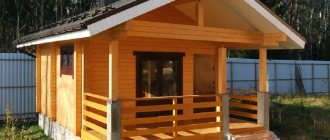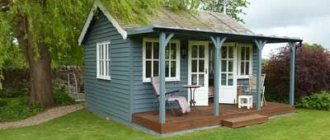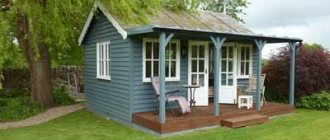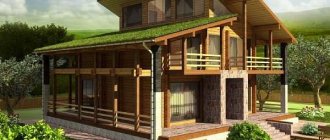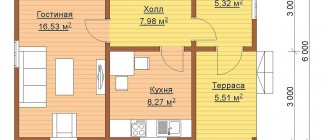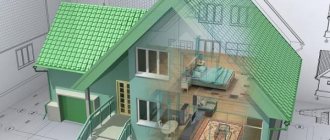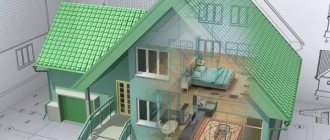The concept of a residential and garden house and their differences. Residential building
217-FZ introduces a new concept of a garden plot of land - a plot of land intended for recreation of citizens and (or) cultivation by citizens for their own needs of agricultural crops with the right to place garden houses, residential buildings, outbuildings and garages (clause 1 of Article 3 217 -FZ).
At the same time, all land plots with such types of permitted use as “for gardening”, “for gardening”, as well as “dacha land”, “for dacha farming”, “for dacha construction” become equivalent and are recognized as garden land plots (clause 7 of article 54 217-FZ).
It follows from this that the owner of a garden plot of land has the right to place on the plot his choice: a garden house or a residential building.
Until 2021, gardeners were allowed to build only residential buildings on plots without the right of registration (registration), and therefore without the right to permanently reside in them.
With the entry into force of 217-FZ, buildings located on a garden plot, registered in the Unified State Register of Real Estate, as a “ residential building ”, “residential”, are recognized as residential buildings. Consequently, since residential buildings have been recognized as residential buildings, the owners have the right to register in them at their place of residence. At the same time, documents for residential buildings do not need to be reissued (clause 9 of Article 54 217-FZ).
The Town Planning Code of the Russian Federation also equalized the concepts of “individual housing construction object”, “residential building” and “individual residential building” (Clause 39, Article 1 of the Civil Code of the Russian Federation).
Unlike an individual residential building, a garden house is non-residential. The information contained in the extract from the Unified State Register of Real Estate about the purpose of buildings, such as “non-residential structure”, “non-residential” “seasonal use”, with the exception of outbuildings and garages, is recognized as garden houses (clause 11 of article 54 217-FZ).
Also, Article 16 of the Housing Code of the Russian Federation, which contains a list of types of residential premises, does not classify a garden house as residential.
A garden house is only a building for seasonal use, intended to satisfy citizens' household and other needs related to their temporary stay in such a building (clause 2 of article 3 of 217-FZ).
Therefore, you cannot register in garden houses.
Laws and rules for the location of buildings
To avoid unnecessary questions, we note that the current standards were created taking into account the experience of operating structures and were developed specifically to ensure the safety of health and life. That is, you need to follow the norms not because someone just invented them, this is a real necessity that can save you a lot of nerves, strength and health.
All standards for the location of the house and other structures on the site, which we will talk about, are mandatory or advisory in nature. The first ones must be fulfilled, the second ones - at the request of the owner. The latter include, for example, requirements that were previously in force but were cancelled.
Construction of a residential building on a garden plot
According to Art. 1 of the Town Planning Code of the Russian Federation, an individual residential building has the following features:
- Detached building (i.e. not an annex)
- Number of ground floors – maximum 3;
- Height – up to 25 meters;
- Availability of rooms and auxiliary premises;
- Not intended for dividing into parts of a residential building.
The construction of a residential building on a garden plot does not differ from the construction on a land plot intended for individual housing construction, with the exception of the following points:
1. Territorial zone. According to paragraph 2 of Art. 23 217-FZ, the construction of capital construction projects on garden land plots is permitted only if such land plots are included in the territorial zones provided for by the rules of land use and development, in relation to which town planning regulations have been approved that establish the maximum parameters for such construction. For example, a garden plot of land is located in the territorial zone CX-1 - Gardening Zone, but the land use and development rules in this zone do not provide for the construction of capital construction projects, so it will not be possible to obtain permits for construction.
TIP: To find out in which territorial zone the land plot is located, you need to order an urban planning plan for the land plot (GPZU) from the local government - free of charge, period - 1 month. or an extract from the information system for supporting urban planning activities (extract from ISOGD) - usually for a fee (up to 1000 rubles), period - up to 1 week.
2. Extension of the dacha amnesty. Since August 2018, there is no requirement to obtain permission to build a residential building. Instead of a construction permit, it is necessary to receive a notification about the compliance of the planned facility and subsequently a notification about the compliance of the constructed facility with legal requirements.
But in connection with the extension of the second dacha amnesty until March 1, 2021 , owners can register existing houses in a simplified manner without sending a notification to the administration and complying with the requirements of the town planning regulations (Part 12 of Article 70 218-FZ). Cadastral registration and registration of ownership of a residential building will be carried out on the basis of a technical plan and declaration.
Moreover, until 03/01/2021, the verification of whether a building is residential or non-residential is determined by the cadastral engineer, and not by the local government.
After 03/01/2021, registration and registration of the house will be carried out in a notification manner, that is, through notifications about planned construction / about the completion of construction with a mandatory visit to the site by specialists from the administration.
Other requirements and standards for site planning
In addition, when determining the permitted location of buildings on a site in 2021, existing sanitary, fire and environmental standards must be taken into account.
Sanitary
These are standards designed to protect the health and lives of people, so they cannot be neglected. In accordance with them it is necessary:
- keep the house and cellar 12 meters away from animal sheds and outdoor toilets;
- ensure a distance of 8 meters or more between the house/cellar and the bathhouse;
- maintain at least 8 meters between the well on one side and the septic tank, toilet or compost heap on the other.
The same standards apply to residential buildings in neighboring areas.
Fire protection
According to the current requirements in Russia, the distance between buildings within the site must correspond to the following table:
You need to work with the table as follows: let’s say you need to calculate the distance between your concrete house and your neighbor’s wooden one. You need to find the intersection between A (non-combustible building) and B (combustible) - 10 meters.
Environmental
Their main purpose is to preserve nature. According to them:
- the building boundary must begin at a distance of at least 15 meters from the forest boundaries;
- It is prohibited to fence off areas for the beach or walkways on the coastline.
Conversion of a garden house into a residential building
The procedure for recognizing a garden house as a residential building is regulated by Decree of the Government of the Russian Federation dated January 28, 2006 No. 47 “On approval of the Regulations on the recognition of premises as residential premises...” (as amended on December 24, 2018) (hereinafter referred to as the Regulations).
Requirements for a residential building:
According to Art. 15 Housing Code of the Russian Federation, Art. 4 of the Regulations, residential premises are recognized as isolated premises, which are intended for the residence of citizens, are real estate and are suitable for living, meeting established sanitary and technical rules and regulations, and other legal requirements.
In other words, a residential building must:
- To be built on a foundation, i.e. have a strong connection with the earth;
- Be safe for the life and health of residents;
- Have electricity;
- Be provided with water supply;
- Have a sewerage system (septic tank);
- Be provided with heat supply.
Required documents:
- Application for recognition of a garden house as a residential building.
The application is written in free form with the obligatory indication of the following information:
- Full name of the applicant;
- Postal or email address of the applicant;
- Cadastral number of the land plot;
- Cadastral number of the garden house.
- Method of obtaining a decision from a local government body (in person, by mail, at the MFC).
Sample application:
- Extract from the USRN for a garden house. If the garden house is not registered, then the title document for the house (sale and purchase agreement, certificate of inheritance, etc.). Providing an extract is not mandatory.
- Conclusion on the inspection of the technical condition of the object. This document is the basis for making a decision on converting a garden house into a residential one. The conclusion is prepared by a specialized organization or individual entrepreneur that is a member of the SRO in the field of engineering surveys. An example of such a conclusion:
- If the garden house is under mortgage, then the notarized consent of the mortgagee (bank) to re-register the house is required.
Submission of documents to the Administration.
Documents are submitted in person to the Administration or through the MFC. In response, the Administration or MFC specialist issues the applicant a receipt for receipt of documents.
The application review period is 45 calendar days.
Upon expiration of the specified period, the Administration makes one of two decisions:
- on recognition of a garden house as a residential building;
- on refusal to recognize a garden house as a residential building.
In case of refusal, the Administration is obliged to refer in its decision to one of the following grounds for refusal:
- The application does not contain mandatory information (postal address, cadastral numbers);
- There is no conclusion on the inspection of the object;
- The applicant is not the owner of the garden house;
- The Unified State Register of Real Estate does not contain information about rights to a garden house;
- The consent of the mortgagee (bank) has not been submitted;
- The types of permitted use of the land do not include the placement of a house.
An applicant who does not agree with the decision to refuse has the right to appeal it in court within 3 months.
The house has two or more apartments with separate exits
Case No. A70-15067/2019 reached the Supreme Court of the Russian Federation, and the main issue that was considered in all instances was determining the status of the house - whether it was multi-apartment or individual residential.
It started with the fact that in Tyumen the administration held an open competition to select a management organization for a building in which there are only two apartments. The management company that won the competition submitted an application and a package of documents to the GZHN body to include the house in the register of regional licenses: copies of the selection protocol and the management agreement with the owners.
Based on the results of consideration of the application, the State Housing Inspectorate refused the company to make changes to the register, citing paragraphs. “a” clause 5 of order No. 938/pr: The MA did not indicate the address of the apartment building in the application, did not attach a copy of the competitive selection protocol and the management agreement. GZHI noted that all the data in the documents does not relate to apartment buildings, but to a residential building, since the apartments, according to the technical documentation, do not have access to common areas, but have separate entrances. The building cannot be classified as an apartment building.
The managing organization did not agree with this position of the GZHI and filed a lawsuit demanding that the department’s refusal be declared illegal and oblige the GZHI to make changes to the register of licenses.
Penalties for non-compliance
Current legislation provides for penalties for owners who do not comply with these norms and requirements. If they are ignored, penalties may be applied to the person:
- administrative responsibility;
- fines;
- mandatory demolition of structures that do not meet the standards.
Compliance with the rules is not just an obligation, it is an opportunity to develop a site comfortably and safely. Regulations are created to protect people from many problems. By ignoring the rules, you endanger yourself and your loved ones.
The Render House company is engaged in the construction of turnkey cottages in compliance with all norms and requirements. To get advice and choose a project, call the phone number in the site header.
The service for changing the status of residential or non-residential premises is completely moving to an online format
Starting April 29, ] “Transfer of residential (non-residential) premises to non-residential (residential) premises” [/anchor] will be completely electronic. Initially it was provided in paper form, and since 2015 it has also become available online.
About half of applicants already receive the service on mos.ru, said Vladimir Efimov, Deputy Mayor of Moscow for Economic Policy and Property and Land Relations.
“The state service “Transfer of residential (non-residential) premises into non-residential (residential) premises” allows you to change the functional purpose of the premises. For example, convert an apartment into an office, store or beauty salon, or, conversely, convert a non-residential premises into a residential category. In 2021, the City Property Department received more than 250 such requests, more than 140 requests were received electronically via mos.ru. From April 29, it will be possible to submit an application and receive results only online. This can be done at any convenient time, regardless of location, and you can monitor the progress of the provision of public services in your personal account on the portal,” said the Deputy Mayor.
It is possible to transfer residential premises to non-residential premises and vice versa within 34 working days (excluding the period of suspension of the provision of public services). It is important that original documents must be provided within five days after registration of the application. Individuals can do this at any location; individual entrepreneurs and legal entities can do this at the one-stop service of the City Property Department. If electronic samples of documents are attached to the application and contain an electronic signature of the person who issued the document or a notary, there is no need to provide the originals. The result of the public service will be sent to the applicant’s personal account on mos.ru.
Online services in the property, land and housing spheres are being developed by the Department of City Property together with the Department of Information Technologies and the State Public Institution “New Management Technologies”.
“To receive government services electronically, the applicant must register on mos.ru. Legal entities and individual entrepreneurs need to obtain an electronic signature, and citizens need full access to their personal account. To do this, after registering on mos.ru, you need to confirm your identity. This can be done online by entering your passport data and SNILS in the “My Documents” section, and then linking a confirmed account on the gosuslugi.ru portal or Sber ID or logging into the portal through an existing one,” noted the Minister of the Moscow Government, Head of the City Property Department Maxim Gaman.
According to him, you can apply for identity confirmation at any one, where you also need to present your passport and indicate SNILS.
Muscovites can find detailed instructions on creating different types of accounts and registering a personal account on mos.ru. In addition, there is information on how to obtain an electronic signature.
Receiving government services online eliminates the need to visit government agencies in person and saves time that would otherwise be spent filling out a paper application.
“When an individual submits an application online, many information will be filled in automatically, based on the data that the user provided in his personal account. Thus, residents do not have to fill out information about the applicant each time and manually enter information about documents,” emphasized Eduard Lysenko, Minister of the Moscow Government, Head of the Department of Information Technologies.
Questions about submitting an application or the required package of documents can be asked on the hotline of the City Property Department. If a resident does not have the opportunity to arrange the service on his own, he must contact any of them. The offices have electronic services areas with computers that anyone can use, and the center staff will advise the applicant on a topic of interest.
More than 380 electronic services are available on mos.ru. City services are collected in one place, this saves time for residents of the capital. To use all the features of the portal, a full account is required. You can get it online, including by registering at gosuslugi.ru, through Sber ID, as well as at any My Documents office.




